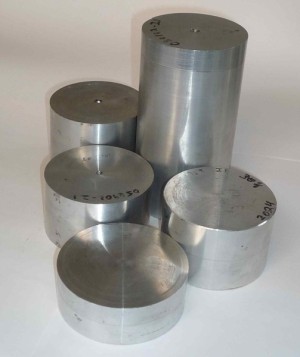
High temperature Aluminum alloys
Conventional high temperature Aluminum alloys like A4032 or A2618 are in use for high performance pistons, Aerospace airframe and other components. Above 300°C these alloys lose signifcant strength. To overcome the limitation new Aluminum alloys made via powder processing have been developed. Some of these advanced high temperature Aluminum alloys could replace Titanium or even Steel.
These alloy show exceptional thermal stability even after hundreds of hours at service temperature and outperform conventional high temperature Aluminum alloys like A4032 and A2618, significantly.
Most of these new high temperature Aluminum alloys require new processing routes like advanced powder processing. Additionally processes like squeeze casting are in use for the production of particle reinforced Metal-Matrix-Composites.
The aim of these new processes is to obtain a finer microstructure and higher strength. The rapidly solidifying processes allow a higher solubility of alloying elements because of the higher cooling rate.
Al-MS89
Aluminum Al-MS89 is a high temperature Aluminum alloy made via an advanced powder process. The alloy shows extrem temperature stability. Even after thousands of hours at high temperature the properties remains pretty stable. In contrast to many Aluminum-Silicon based alloys Al-MS89 shows also good ductility. Al-MS89 is available up to D=100mm. It can be used for advanced Automotive, Aeropsace, Semiconductor and other industrial application.
Al-SF25
Aluminum Al-SF25 is an Aluminum-Silicon-Alloy made via spray forming. It shows a good combination of properties like high temperature strength, high stiffness and low CTE. Al-SF25 shows excellent machining behaviour compared to other Aluminum-Silicon-Alloys. Like most of the Aluminum-Silicon-Alloys, Al-SF25 show a comparable low ductility. This needs to be considered during part designing.
Al-MS31
Aluminum Al-MS31 is a powder route manufactured high temperature alloy with high strength up to 350°C. This alloy shows excellent temperature stability after llong time thermal exposure. It has excellent machining properties in addition to high elastic modulus and very low thermal expansion. This combination of properties can only be found in difficult to machine Aluminum-Metal-Matrix composites. This alloy is an excellent choice compared to Aluminum-Matrix-Composites with all their drawbacks concenring processing and machining.
Typically available in dia. up to 120mm. Larger diameter up to 400mm or blocks can be made via hot pressing with a minor reduction of tensile strength.
Al-MS95
Aluminum Al-MS95 is a powder route manufactured high temperature alloy with exceptional strength up to 300°C. With room temperature strengths up to 650MPa including good ductiltiy it can be used for a wide range of applications. Thermal stability is quite good up to 350°C even after 1.000h of thermal exposure.
Typically available in dia up to 120mm. Larger diameter or blocks can be made via hot pressing with some reduction of tensile strength.
DSC-Aluminum
DSC-Aluminum is a Metal-Matrix-Composite. A ceramic preform made of nanoscale (200-400 nm) Alumina particles is infiltrated either with pure Aluminum or an Aluminum alloy. Because of the nanoscale particle size dispersion-strengthening occurs. This results in a significant increase of strength. Dispersion-strengthened Materials like DSC-Aluminum show excellent temperature strength and stability. The ceramic particles increase the elastic modulus and so the stiffness significantly. The thermal coefficient of expansion (CTE) is lower than for conventional Aluminum alloys. DSC-Al is a material of choice for components requiring high temperature strength and/or stiffness.

